If your Maytag refrigerator is making noise, don't panic! Start by identifying the sounds. Humming is usually normal, but buzzing could indicate a water valve issue, while rattling might stem from loose items or an unlevel surface. Verify your refrigerator is properly leveled to minimize vibrations. A loose drain pan can also contribute to clatter, so check its alignment. Regularly cleaning the condenser coils and inspecting the fan motors can help reduce noise too. If noises persist or if louder sounds occur, it might be time to seek professional help. There's much more to explore about maintaining your fridge efficiently.
Key Takeaways
- Ensure your refrigerator is level to minimize vibrations and rattling noises.
- Check for a loose drain pan and secure it to prevent loud vibrations.
- Clean the condenser coils regularly to enhance efficiency and reduce noise.
- Inspect fan motors for dust buildup and ensure they operate smoothly to prevent squealing sounds.
- Disconnect the ice maker if not in use to eliminate associated buzzing noises.
Understanding Normal Noises

When you hear your Maytag refrigerator humming away, it's important to recognize that some sounds are completely normal. These typical operational noises are part of the normal operation of a refrigerator and don't always signal a problem.
For instance, buzzing sounds often come from the water valve opening for the ice maker, and pulsating or whirring noises are common during compressor adjustments.
You might notice cracking and popping noises as the refrigerator's walls expand and contract due to temperature changes. Hissing or dripping sounds indicate the flow of refrigerant in the compressor, while sizzling can occur when water drips onto the defrost heater.
Understanding these normal sounds helps you distinguish between typical operational noises and loud noises that could indicate potential issues.
By familiarizing yourself with what's considered normal for a refrigerator, you can enjoy peace of mind knowing that most sounds are simply part of everyday function.
Common Causes of Noises
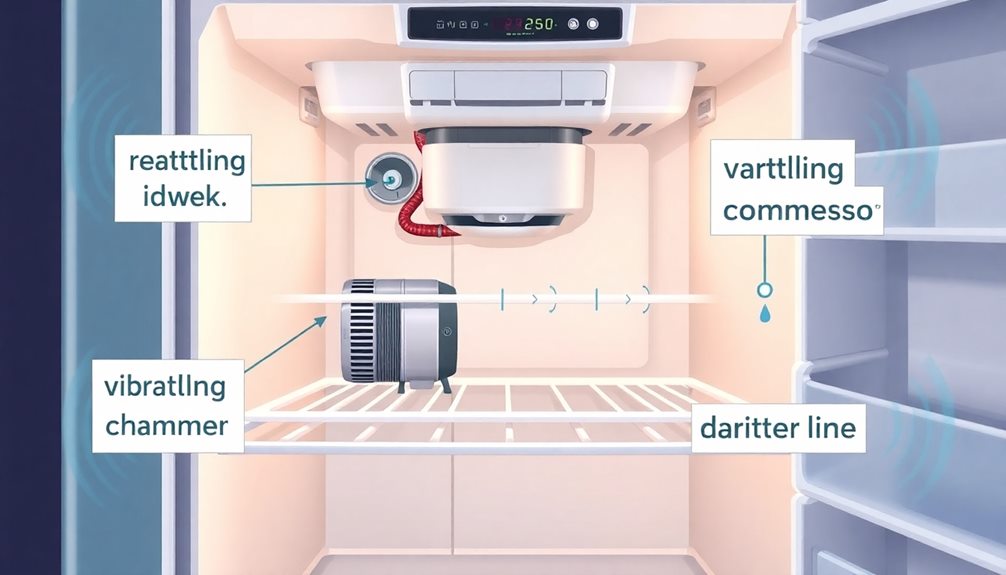
Noises from your Maytag refrigerator can often be traced back to common causes that aren't necessarily indicative of a malfunction.
Understanding these typical sounds can help you determine if your refrigerator making noise needs attention or is just performing normally. Here are some common culprits:
- Buzzing: This often comes from the water inlet valve opening for the ice maker.
- Vibrating: Improper leveling of your fridge can lead to these annoying sounds.
- Rattling: Water flow or items placed on top of the refrigerator could be the source.
- Pulsating/whirring: These sounds are typical as the fans adjust during compressor operation.
Additionally, cracking or popping noises result from the expansion and contraction of the refrigerator walls, which is normal in temperature fluctuations.
Hissing or dripping noises indicate refrigerant flow, while sizzling sounds occur when water drips on the heater during defrost.
If you hear knocking noises, they may relate to the water inlet valve—consider having it assessed if the sound persists.
To maintain a quiet environment, always remember to inspect the fan and verify your normal Maytag refrigerator is level.
Identifying Specific Sounds
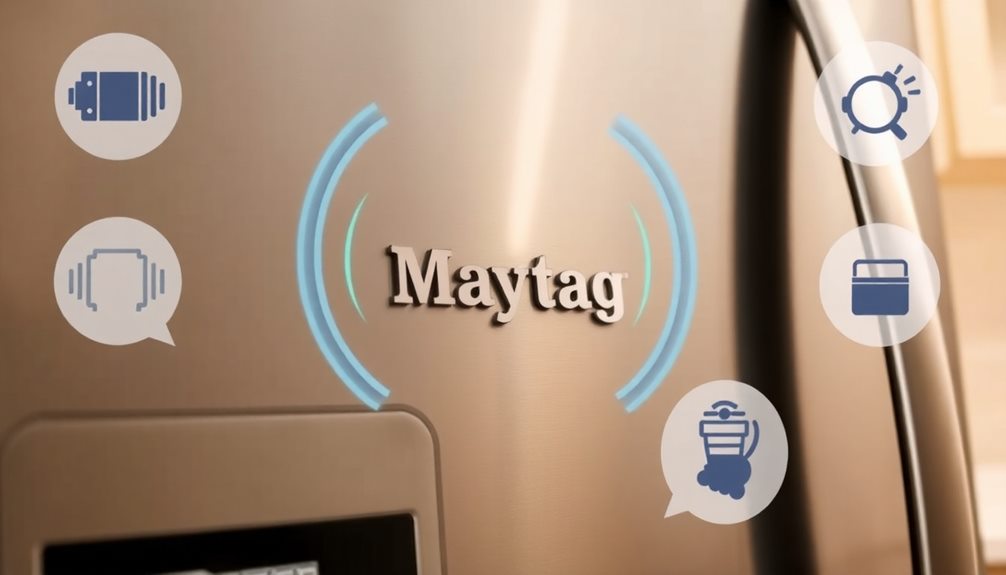
Understanding the specific sounds your Maytag refrigerator makes can help you pinpoint potential issues or confirm that everything's working as it should.
If your refrigerator is making noise, start by listening for loud humming. This often indicates that the condenser fan is working hard to keep things cool. Buzzing noises might signal the ice maker's water valve opening, which is normal.
If you hear cracking or popping, it's usually just the walls expanding and contracting. However, if you notice vibrating sounds, it may mean your fridge isn't level, so check its placement. Rattling noises might be from water flow or items resting on top of the unit.
Pay attention to hissing or dripping sounds; these are typically the refrigerant flowing and are considered normal.
On the other hand, squealing noises could point to problems with the evaporator fan motor, especially if they get louder when you open the door.
Finally, clicking sounds may indicate that the ice maker is off or disconnected from the water supply, so verify everything's set correctly.
Identifying these sounds can save you time and effort in addressing potential issues.
Securing Loose Drain Pan

If your Maytag refrigerator is making loud noises, a loose drain pan might be the culprit.
You can easily secure it by checking for any loose hardware and tightening it according to your user manual.
Taking the time to address these issues will help reduce vibrations and enhance your fridge's performance.
Identify Drain Pan Issues
A loose drain pan can create annoying vibrations in your Maytag refrigerator as it gathers condensation from the defrost system. If you're experiencing loud vibrating noises, it's important to identify and address any issues with the drain pan.
Start by checking if the drain pan is securely fastened to avoid further noise problems.
Here are some steps to help you identify drain pan issues:
- Inspect the drain pan for any visible debris that could affect its stability.
- Consult your user manual for specific instructions on accessing and adjusting the drain pan.
- Confirm the drain pan is properly aligned and not tilted, which can lead to noise.
- Regularly maintain the drain pan to prevent future vibration issues.
Tightening Techniques Explained
Properly securing the drain pan is vital for maintaining a quiet and efficient Maytag refrigerator. A loose drain pan can create loud vibrating noises, which you can often fix by applying some tightening techniques to guarantee it's properly aligned.
Additionally, guaranteeing proper airflow around your appliance is essential, as it can enhance performance and reduce noise levels. Start by consulting your refrigerator's user manual for specific instructions and the necessary tools.
To access the drain pan, you may need to remove some panels or components. Once you've reached it, check for any debris that might be affecting its stability. Clear out any buildup that could prevent the pan from resting securely.
Next, inspect the hardware securing the drain pan in place. Tighten any loose screws or bolts using the appropriate tool, guaranteeing that the pan is firmly fastened. This step not only helps reduce noise but also maintains the efficiency of your refrigerator's defrost system.
For further maintenance tips, consider checking out air purifier maintenance dos and don'ts.
Inspecting the Fan Motor
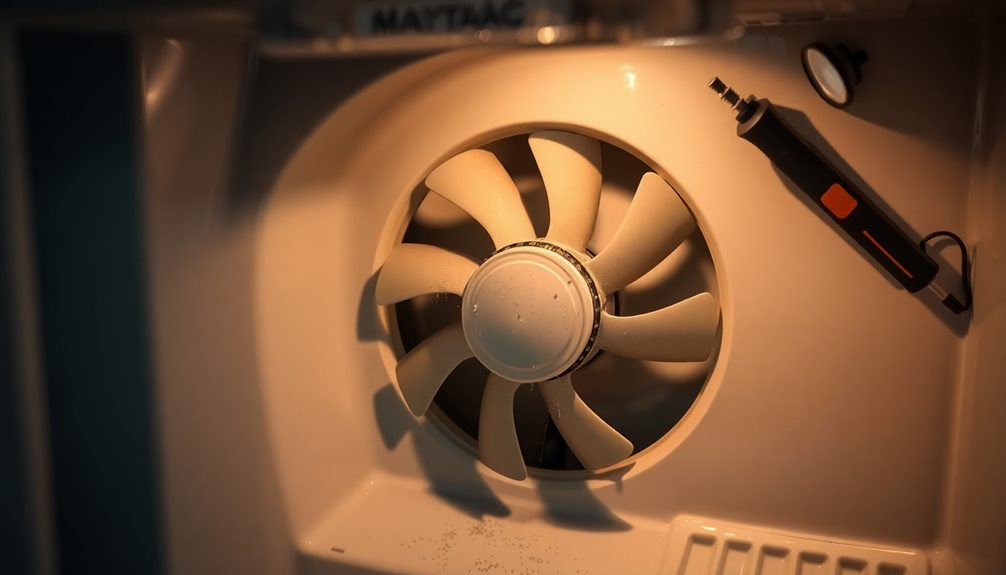
Next, you'll want to inspect the fan motor to identify any issues causing that annoying noise.
Start by checking for wear and tear, and make sure the fan blades can spin without obstruction.
If you notice any irregularities, addressing them promptly can help restore your refrigerator's quiet operation.
Fan Motor Inspection Steps
Before diving into the inspection of your refrigerator's fan motor, make certain to unplug the appliance to secure your safety. This step is vital to prevent any electrical hazards while you inspect the fan motor.
Regular maintenance of household appliances, much like the importance of essential repairs for vehicles, helps promote longevity and efficiency.
To begin, locate the evaporator fan motor, usually found behind a panel in the freezer compartment. You'll need to remove this panel, which is typically secured with screws or clips.
Once you have access, here are some key steps to follow during your inspection:
- Manually spin the fan blade: Check for smooth operation and listen for any unusual noises.
- Look for signs of wear: Any visible damage or excessive dust buildup can indicate issues.
- Test with the door open: If the fan sounds louder when the refrigerator door is open, it might be malfunctioning.
- Consider replacement: If you notice any problems during your inspection, it may be time to replace the fan motor to restore proper function and silence.
Regularly inspecting the fan motor can help prevent noise and promote your refrigerator continues to operate efficiently.
Common Fan Issues
After inspecting the fan motor, you might notice some common issues that could be causing unwanted noise in your refrigerator. If you hear squealing or increased noise, especially when the refrigerator door is open, check the evaporator fan motor. A malfunction here can lead to significant refrigerator noise.
Don't forget about the condenser fan, usually located at the back or underneath your fridge. It can create noise if it's obstructed or worn, so check for any debris or damage that could be causing issues.
Regular maintenance of your fan motors, such as cleaning and ensuring proper alignment, can reduce excess noise and prolong the life of your appliance.
If the evaporator fan sounds louder than normal, you may need to access it behind a panel for inspection. Look for blockages or mechanical problems that could be affecting its performance.
If you find that the fan motors are faulty and the noise persists even after cleaning, you might need to replace the fan. In such cases, it's best to call a professional, especially if your refrigerator isn't cooling effectively.
Checking the Water Inlet Valve
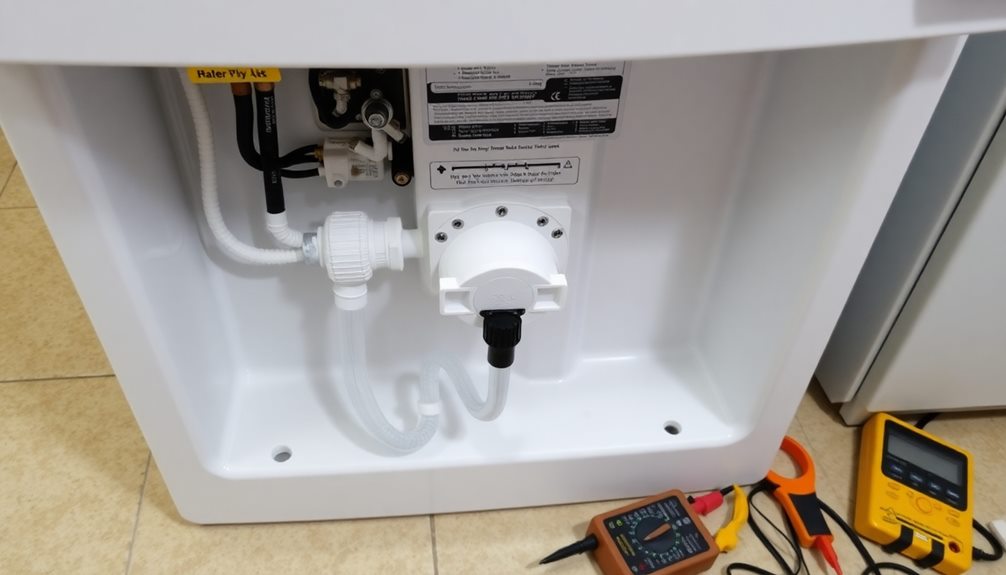
Addressing the potential chaos caused by a noisy refrigerator often begins with inspecting the water inlet valve. This valve controls the flow of water to your ice maker and water dispenser. If you hear a knocking noise, it could indicate an issue with the valve, often caused by mineral buildup or electrical malfunctions. These issues can restrict the water flow, leading to reduced water and ice production.
When checking the water inlet valve, consider the following:
- Confirm the water line is securely connected to the inlet valve to avoid unnecessary noise.
- Inspect the valve for any mineral buildup that may affect its performance.
- Listen for unusual sounds during operation, as they can signal a malfunction.
- If the valve appears damaged or isn't functioning correctly, seek professional replacement to confirm proper functionality.
Regular inspection of the water inlet valve can help keep your refrigerator running smoothly and minimize those annoying noises.
Taking these steps not only enhances your refrigerator's performance but also extends its lifespan.
Diagnosing Compressor Issues
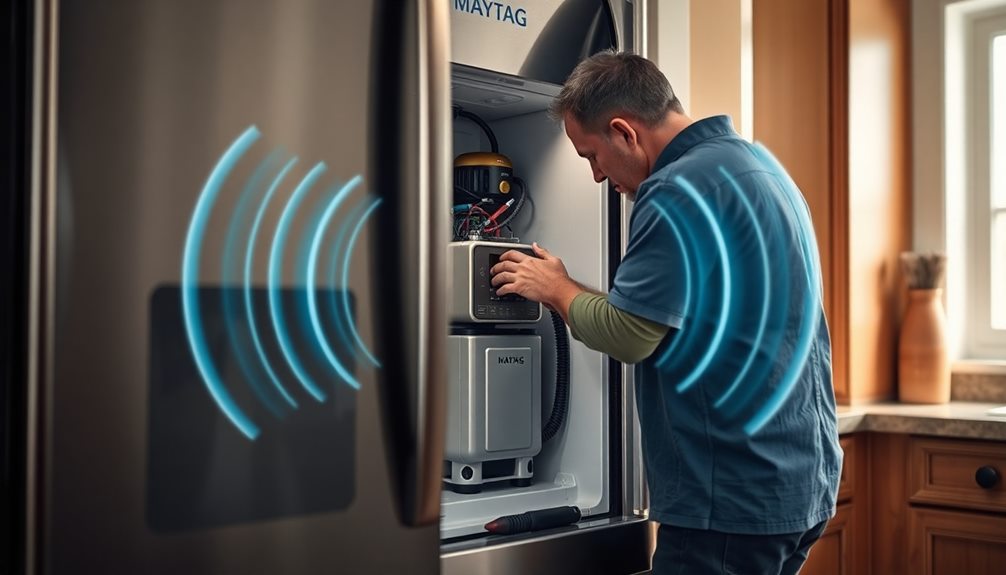
A noisy Maytag refrigerator often points to underlying compressor issues that can affect its cooling performance. If you're hearing loud humming or excessive noise, it may indicate a failing compressor, which could lead to inadequate cooling. You should monitor the sounds and the refrigerator's cooling efficiency closely.
Start by listening for unusual noises; if the noise continues or becomes more pronounced, it's time to take action. Ignoring these signs can lead to more significant problems down the line.
Regular maintenance, like cleaning the condenser coils, can help prolong the compressor's life, but once you notice persistent noise, you might need to evaluate a repair.
A professional assessment is essential at this stage. They can diagnose the compressor issues accurately and determine if repairs are necessary.
Tips for Reducing Noise
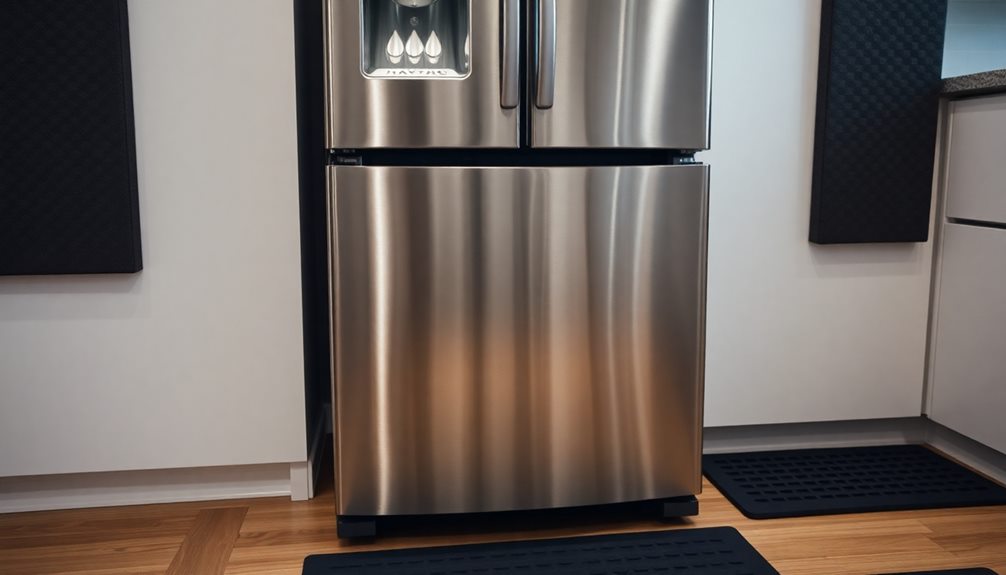
To quiet down your noisy Maytag refrigerator, start by checking a few key areas. A refrigerator making loud noises can often be fixed with some simple adjustments.
First, disconnect the ice maker if it's not connected to a water supply; this can eliminate unnecessary noise. Next, verify your refrigerator is properly leveled. An unstable unit can cause vibrating sounds that are definitely a cause for concern.
Here are some additional tips to take into account:
- Clean your refrigerator's condenser coils regularly to help identify and mitigate potential noise sources.
- Secure any excess tubing to minimize rattling noises during operation.
- Consult the Maytag troubleshooting guide to determine what specific issues might be causing the noise.
- Perform routine maintenance checks to verify everything is functioning properly.
When to Call a Professional

If your Maytag refrigerator produces loud or unusual noises that stand out from its normal operation, it's time to contemplate calling a professional. Persistent sounds like knocking or humming could indicate an issue with the noisy refrigerator compressor or fan motors, which need evaluation by an experienced technician.
Don't ignore these signs, as they may lead to more significant problems if left unchecked.
If you notice a lack of cooling in your refrigerator alongside abnormal noises, it's advisable to seek professional help right away. This situation often points to potential fan or compressor failures that require immediate attention.
Additionally, if your refrigerator is excessively vibrating or rattling despite basic maintenance attempts, contacting a repair service can help prevent further damage.
Regularly monitor your refrigerator's noise patterns. If the sounds become louder or more frequent over time, this is another indicator of when to call a professional.
Trust your instincts—if you feel something's off with your Maytag refrigerator making noise, don't hesitate to reach out for expert refrigerator repair services.
Addressing these issues promptly can save you time and money in the long run.
Maintaining Your Refrigerator

Regular maintenance is essential for keeping your Maytag refrigerator operating smoothly and quietly. By taking the time to perform routine checks and cleaning, you can minimize any loud refrigerator noises and extend its lifespan.
Here are some key maintenance tasks to take into account:
- Clean the condenser coils regularly to guarantee efficient operation and prevent excessive noise.
- Inspect and clean the evaporator and condenser fan motors to eliminate sounds caused by wear and tear or obstructions.
- Properly level your refrigerator to reduce vibrations and rattling noises that occur when it's uneven.
- Secure the drain pan by tightening its hardware to eliminate loud vibrating noises associated with condensation collection.
Frequently Asked Questions
Why Does My Maytag Refrigerator Make so Much Noise?
Your Maytag refrigerator might make noise due to several factors. Check for buzzing from the ice maker, vibrations from improper leveling, or gurgling sounds from refrigerant movement, which are often normal and not a cause for concern.
How Can I Stop My Refrigerator From Making Noise?
To stop your refrigerator from making noise, level it properly, secure loose parts, clean condenser coils, and inspect fan blades. Disconnect the ice maker if unnecessary, and you'll enjoy a quieter kitchen environment.
How Do You Turn off the Alarm on a Maytag Refrigerator?
To turn off the alarm on your Maytag refrigerator, locate the control panel and press the "Alarm" or "Silence" button. If it continues, check for any open doors causing the alert.
How Do I Quiet a Noisy Refrigerator Compressor?
To quiet a noisy refrigerator compressor, check if it's level on the floor and clean the condenser coils. Listen for obstructions in the fan, and consider calling a technician if noise persists.
Conclusion
In the end, a little noise from your Maytag refrigerator is just its way of reminding you it's hard at work keeping your food fresh. By understanding the sounds it makes and taking a few simple steps, you can restore peace to your kitchen. If things get too loud, don't hesitate to reach out for help. A quiet home is a happy home, and your trusty fridge deserves the care to keep it running smoothly.









